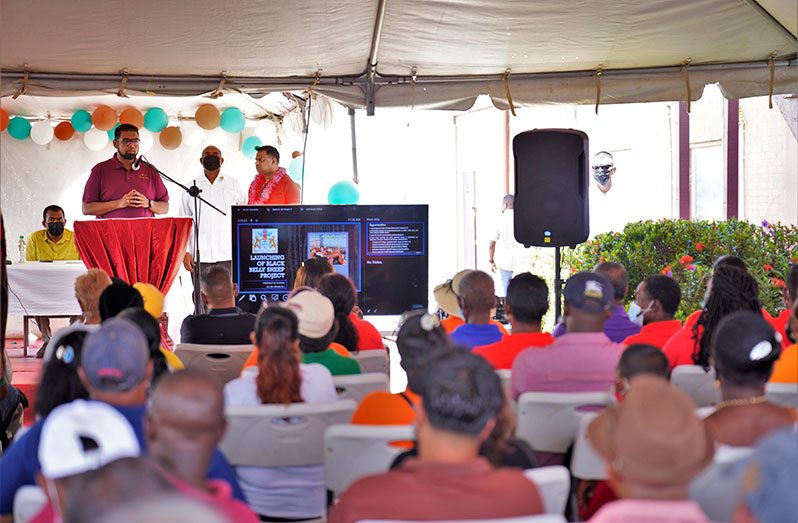–1,000 Black Belly sheep to arrive from Barbados in two weeks
REGION Five (Mahaica-Berbice) is being actively positioned to become the livestock capital of not only Guyana, but the larger Caribbean Community (CARICOM) as well.
This vision, shared by President Dr Irfaan Ali during the launch of a Black Belly Sheep Project at Onverwagt, West Coast Berbice on Sunday, was music to the ears of scores of farmers who were in attendance.
In a detailed presentation about the project, the Head of State informed the attendees that within the next two weeks, 1,000 Black Belly sheep will be arriving from Barbados to kickstart the project which has already benefited from the commitment of 78 farmers.
The project is intended to pave the way for Guyana to tap into the region’s hefty food-importation bill, which sees CARICOM countries collectively spending some U.S.$43 million just to import mutton alone. And even though Guyana’s food-production capabilities are impressive, the country still imports approximately U.S.$130,000 worth of mutton.
With the Ali-led government now moving aggressively to address the local agri-food systems, President Ali is confident that Guyana has the capacity to supply almost all of the region’s mutton needs.
Already, Guyana has been able to tap into a U.S.$6.8 million market by being the confirmed supplier of mutton for Barbados.
“The Barbados market alone is tremendous,” the President reflected.
This was one of the many positive outcomes of a series of extensive engagements between President Ali and Barbados’ Prime Minister, Mia Mottley, within the past year.
But for Guyana to truly make its impact on the Caribbean market, President Ali said that investments have to be made, particularly to inspire the continued efforts of farmers who are essentially the backbone to execute government’s vision.
“We have to increase production, improve breed and use advanced technology and infrastructure,” Dr Ali recognised.
With an initial investment of US$3 million, Dr Ali said that the onset of the Black Belly Sheep project targets 2,000 heads of sheep, and is slated for significant expansion in order to produce at least 7,000 tonnes of mutton by the end of five years. It is also expected to create at least 4,500 direct and indirect jobs.

Further, President Ali was keen on acknowledging the shortcomings of the sheep-production industry, pointing to inadequate climate-smart housing facilities for the sheep; poor pasture management; limited technology transfer and high costs of production, among other things.
As it relates to the inadequate access to feed, President Ali said that challenges being faced will be significantly alleviated by the 115-acre soya bean, and five-acre corn pilot projects at Ebini, on the Upper Berbice River.
In the meantime, high costs of production will also be largely cushioned by the many clean-energy initiatives being pursued by the People’s Progressive Party/Civic government, including the U.S.$900 million gas-to-energy- project earmarked for Wales on the West Bank of Demerara.
SUPPORT MACHINERY
Further, President Ali said that global players have already been engaged to lend critical support to local farmers who require training on technologies and various innovative means of sheep-rearing.
“We are going to hire a dedicated team to work with the farmers…an entire machinery to work with you,” Dr Ali emphasised.
He explained that the sector will go through “infantry” period. “We now have to start from nothing to build up production,” the Head of State added.
DATABASE
Added to that, President Ali said that each farm will be outfitted with an electronic monitoring system, which will help to inform the needs of the farmers and the industry. “This will be linked to national database,” Dr. Ali noted.
EQUALITY AND INCLUSIVITY
Moreover, President Ali wants to ensure that the project is executed in a manner that demonstrates inclusivity. Particularly, he has insisted that at least 20 per cent of the farmers participating in the project must be led by women, whilst 35 per cent must have the integral involvement of youths.
“This is part of building the future…agriculture is. It is not only about food production…it has to also demonstrate our ability to create an equal society,” Dr Ali posited.
He said that in addition to Region Five, communities such as Karasabai will also be playing an important role.
“This is a well-calculated vision we’re presenting you with today,” the President assured residents.




.png)









